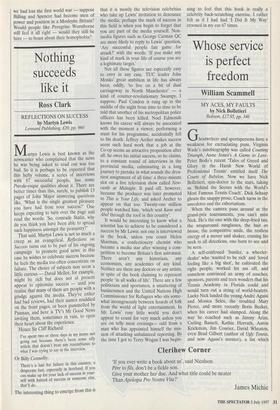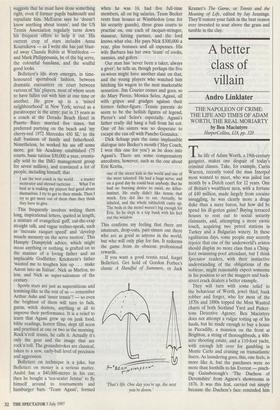Whose service is perfect freedom
William Scammell
MY ACES, MY FAULTS by Nick Bolletieri Robson, £17.95, pp. 346 Ghostwriters and sportspersons have a weakness for excruciating puns. Virginia Wade's autobiography was called Courting Triumph, Anne Jones's A Game to Love. Peter Bodo's recent 'Tales of Greed and Glory in the Harsh New World of Professional Tennis' entitled itself The Courts of Babylon. Now we have Nick Bolletieri, spin-doctor to the stars, taking us 'Behind the Scenes with the World's Most Famous Tennis Coach'. Dick Schaap ghosts the snappy prose, Coach turns in the anecdotes and the exhortations.
When the camera pans around at the grand-prix tournaments, you can't miss Nick. He's the one with the deep-fried tan, the wraparound sunglasses, the hair en brosse, the competitive smile, the restless energy of a mover and shaker, craning his neck in all directions, one born to see and be seen.
A self-confessed 'hustler, a wheeler- dealer' who 'wanted to be rich' and 'loved feeling like a big shot', he cultivated the right people, worked his ass off, and somehow convinced an army of coaches, sponsors, parents and teen wonders that his Tennis Academy in Florida could and would turn out a string of world-beaters. Lucky Nick landed the young Andre Agassi and Monica Seles, the troubled Mary Pierce, and more recently Boris Becker, when his career had slumped. Along the way he coached such as Jimmy Arias, Carling Bassett, Kathie Horvath, Aaron Krickstein, Jim Courier, David Wheaton, even Brad Gilbert (author of Ugly Tennis, and now Agassi's mentor), a list which suggests that he must have done something right, even if former pupils badmouth and repudiate him. McEnroe says he 'doesn't know anything about tennis', and the US Tennis Association regularly turns down his frequent offers to help it out. His current crop of stars includes Anna Kournikova — as I write she has just blast- ed away Chanda Rubin at Wimbledon and Mark Philippoussis, he of the big serve, the colourful bandana, and the soulful good looks.
Bolletieri's life story emerges, in time- honoured sportsbook fashion, between dramatic encounters on court between various of 'his' players, most of whom seem to have fallen out with him at one time or another. He grew up in a 'mixed neighbourhood' in New York; served as a paratrooper in the army; put in 15 years as a coach at the Dorado Beach Hotel in Puerto Rico; married five times, but preferred partying on the beach and 'my cherry-red 1972 Mercedes 450 SL' to the dull business of family and fatherhood. Nonetheless, he worked his ass off some more, got his Academy established (75 courts, basic tuition $30,000 a year, eventu- ally sold to the IMG management group for seven million), and convinced a lot of people, including himself, that
I am the best coach in the world . . . a master motivator and shrewd tactician . . . What I'm best at is making my players feel good about themselves. I try to get to their minds. Then I try to get more out of them than they think they have to give.
This frequently involves writing them long, inspirational letters, quoted at length, a mixture of evangelical guff, cut-the-crap straight talk, and vague techno-speak, such as 'increase racquet speed' and 'develop muscle memory on the serve motion'. This Humpty Dumptyish advice, which might mean anything or nothing, is grafted on to the manner of a loving father and an implacable Godfather. Krickstein's father `wanted me to toughen him up . . . make Aaron into an Italian'. Nick as Marlon, no less, and Nick as super-salesman of the century.
Sports stars are just as superstitious and lemming-like as the rest of us — remember Arthur Ashe and 'inner tennis'? — so even the brightest of them will turn to fads, gurus, witch doctors, anything at all to improve their performance. It is a relief to learn that Agassi grew up on junk food, bible readings, horror films, slept till noon and practised at one or two in the morning. Rock'n'roll tennis, he calls it. Actually it's only the gear and the image that are rock'n'roll. The groundstrokes are classical, taken to a new, early-ball level of precision and aggression.
Bolletieri on technique is a joke, but Bolletieri on money is a serious matter. Andre has a $40,000-stereo in his car; then he bought a 'ten-seater Jetstar' to fly himself around to tournaments and hamburger bars. 'Team Agassi', formed when he was 16, had five full-time members, all on big salaries. Team Becker rents four houses at Wimbledon (one for his security guards), three grass courts to practise on, one each of racquet-stringer, masseur, hitting partner, and the lord knows what else. He pays Nick $300,000 a year, plus bonuses and all expenses. His wife Barbara has her own 'team' of cooks, nannies, and gofers.
Our man has 'never been a taker, always a giver', he tells us, though perhaps the five ex-wives might have another slant on that, and the young players who watched him hitching his wagon to the next marketable sensation. Jim Courier comes and goes, so do Mary Pierce, Monica Seles, Agassi, all with gripes and grudges against their former father-figure. Tennis parents do seem to be the hellish figures of legend, Pierce's and Seles's especially. Agassi's father really did hang a ball from his cot. One of his sisters was so desperate to escape she ran off with Pancho Gonzalez.
Dick Schaap puts the same implausible dialogue into Becker's mouth (`Hey Coach, I won this one for you') as he does into Agassi's. There are some compensatory anecdotes, however, such as the one about Eric Korita,
one of the nicest kids in the world and one of the most talented. He had a huge serve, and on a good day he could beat anybody. But he had no burning desire to excel, no killer- instinct. He really didn't like tennis that much. Eric did like to eat. Actually, he inhaled, and the whole tablecloth came up. The beds in the motel weren't big enough for Eric. So he slept in a top bunk with his feet out the window.
This confirms my feeling that there are amateurs, drop-outs, part-timers out there who are as good as anyone in the world, but who will only play for fun. It redeems the game from its obscene professional rewards.
If you want a good tennis read, forget Bolletieri. Get hold of Gordon Forbes's classic A Handful of Summers, or Jack 'That's life. One day you're up, the next you're down.' Kramer's The Game, or Tennis and the Meaning of Life, edited by Jay Jennings. They'll restore your faith in the best reason ever invented to soar above the grass and tumble in the clay.



























































 Previous page
Previous page